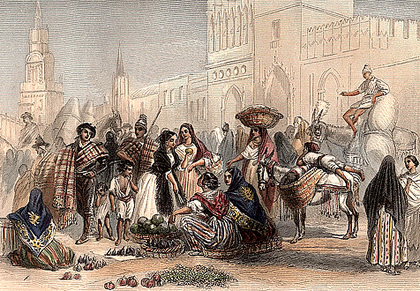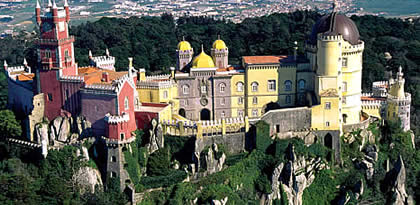World History
Were it not for the tireless efforts of the Portuguese throughout the 15th century in exploring the West African coast, the history of Europe, and the world, might have been discernibly different.
The Portuguese impulse to explore and trade led eventually to the rounding of the African horn, or Cape of Good Hope, by Bartolomeu Diás in 1488, and the epoch-making voyage to India by Vasco da Gama from 1497 to 1499. These voyages and discoveries gave Europeans direct access to the spice market of Asia and dealt a serious economic blow to Europe’s enemies, the Muslims.
In seeking “Christians and spices†in Africa and Asia the Portuguese hoped to find allies against their centuries-old foes and to deprive the Muslims of the wealth made possible by these much sought after commodities.
All of this occurred in the 15th and 16th centuries when Portugal was able to use its early penetration of the Asian market to their great advantage. They did this while Spain, England, France, and the future Dutch Republic were variously occupied with either independence or dominance in Europe.
The area now known as Portugal has been inhabited for as long as the Neanderthals are known to have lived in Europe, some 500,000 years ago. Settled by the Phoenicians during the Iron Age, this area of the Iberian Peninsula was taken by the Romans from the Carthaginians in the third century b.c.e., during the Second Punic War.
In 194 b.c.e. a rebellion broke out against the Romans led by one Viriathus, the leader of the Lusitanians, and other native tribes. Viriathus’s assassination by his own ambassador to the Romans eventually quelled the rebellion, and the Romans then made Lusitania into a Roman colony that prospered for centuries.
In the fifth century c.e. the Germanic tribes that were harassing all of Europe also invaded the Iberian Peninsula. The Suevi, the Vandals, and the Alans made up the first wave of Germanic invasion into Lusitania.
In the sixth century c.e. the Visigoths, another German tribe, defeated the Suevi and captured its capital of Bracara (modern-day Braga). The previous German invaders were either expelled or integrated into the Visigothic culture and hierarchy.
In 711 Islamic forces from North Africa conquered the Visigothic kingdom, forcing the Visigoths to the far north. For the next five centuries the nascent Portuguese nation would struggle to regain this area of the peninsula, a struggle that is commonly known as the reconquista.
The papacy recognized Portugal as an independent kingdom in 1143. Then in 1179 the pope declared Afonso I king of Portugal. Finally in c. 1249 the southernmost area of present-day Portugal, known as the Algarve, was recovered from the Moors.
In 1255 the capital of Portugal was moved to Lisbon, its present-day capital. After the era of exploration and discovery in the 15th and 16th centuries, the Portuguese entered a period of decline, or decadência, in the 17th century.
There were many factors to explain this perceived decline, such as Spanish rule over Portugal from 1580 to 1640, diminishing returns from their colonies around the world, and the increased competition of Portugal’s European neighbors for dominance over these colonies. Portugal never again achieved the imperial heights it possessed in the 15th and 16th centuries.
- Prince Henry The Navigator
Prince Henry the NavigatorPrince Henry the Navigator, the duke of Viseu, was the third son of Joao I, who began the famous Aviz dynasty in Portugal (1385). Henry’s mother, Philippa of Lancaster, was the daughter of John of Gaunt, a prominent English...
- Bull Of Demarcation
Christopher Columbus’s first voyage to the Americas threatened to intensify the rivalry between the Catholic kingdoms of Spain (Castile) and Portugal into open warfare. Both kingdoms wanted to claim all newly discovered lands that were not Christian,...
- Treaty Of Tordesillas
A modification of the papal Bull of Demarcation issued in 1493 by Pope Alexander VI, the Treaty of Tordesillas (June 7, 1494) divided the recently discovered New World between its two signatories, Spain and Portugal. The treaty created an imaginary pole-to-pole...
- History Of Uruguay
History of Uruguay. This is a short but informative overview to the history of the South American nation of Uruguay. From the site: The only inhabitants of Uruguay before European colonization of the area were the Charrua Indians, a small tribe driven...
- History Of Cape Verde
History of Cape Verde. This is a short but good look at the history of this island nation off of the coast of Africa. From the site: In 1462, Portuguese settlers arrived at Santiago and founded Ribeira Grande (now Cidade Velha)--the first permanent...
World History
Portugal
 |
| Portugal |
Were it not for the tireless efforts of the Portuguese throughout the 15th century in exploring the West African coast, the history of Europe, and the world, might have been discernibly different.
The Portuguese impulse to explore and trade led eventually to the rounding of the African horn, or Cape of Good Hope, by Bartolomeu Diás in 1488, and the epoch-making voyage to India by Vasco da Gama from 1497 to 1499. These voyages and discoveries gave Europeans direct access to the spice market of Asia and dealt a serious economic blow to Europe’s enemies, the Muslims.
In seeking “Christians and spices†in Africa and Asia the Portuguese hoped to find allies against their centuries-old foes and to deprive the Muslims of the wealth made possible by these much sought after commodities.
  |   |
All of this occurred in the 15th and 16th centuries when Portugal was able to use its early penetration of the Asian market to their great advantage. They did this while Spain, England, France, and the future Dutch Republic were variously occupied with either independence or dominance in Europe.
The area now known as Portugal has been inhabited for as long as the Neanderthals are known to have lived in Europe, some 500,000 years ago. Settled by the Phoenicians during the Iron Age, this area of the Iberian Peninsula was taken by the Romans from the Carthaginians in the third century b.c.e., during the Second Punic War.
In 194 b.c.e. a rebellion broke out against the Romans led by one Viriathus, the leader of the Lusitanians, and other native tribes. Viriathus’s assassination by his own ambassador to the Romans eventually quelled the rebellion, and the Romans then made Lusitania into a Roman colony that prospered for centuries.
In the fifth century c.e. the Germanic tribes that were harassing all of Europe also invaded the Iberian Peninsula. The Suevi, the Vandals, and the Alans made up the first wave of Germanic invasion into Lusitania.
In the sixth century c.e. the Visigoths, another German tribe, defeated the Suevi and captured its capital of Bracara (modern-day Braga). The previous German invaders were either expelled or integrated into the Visigothic culture and hierarchy.
 |
| portugal castle |
In 711 Islamic forces from North Africa conquered the Visigothic kingdom, forcing the Visigoths to the far north. For the next five centuries the nascent Portuguese nation would struggle to regain this area of the peninsula, a struggle that is commonly known as the reconquista.
The papacy recognized Portugal as an independent kingdom in 1143. Then in 1179 the pope declared Afonso I king of Portugal. Finally in c. 1249 the southernmost area of present-day Portugal, known as the Algarve, was recovered from the Moors.
In 1255 the capital of Portugal was moved to Lisbon, its present-day capital. After the era of exploration and discovery in the 15th and 16th centuries, the Portuguese entered a period of decline, or decadência, in the 17th century.
There were many factors to explain this perceived decline, such as Spanish rule over Portugal from 1580 to 1640, diminishing returns from their colonies around the world, and the increased competition of Portugal’s European neighbors for dominance over these colonies. Portugal never again achieved the imperial heights it possessed in the 15th and 16th centuries.
- Prince Henry The Navigator
Prince Henry the NavigatorPrince Henry the Navigator, the duke of Viseu, was the third son of Joao I, who began the famous Aviz dynasty in Portugal (1385). Henry’s mother, Philippa of Lancaster, was the daughter of John of Gaunt, a prominent English...
- Bull Of Demarcation
Christopher Columbus’s first voyage to the Americas threatened to intensify the rivalry between the Catholic kingdoms of Spain (Castile) and Portugal into open warfare. Both kingdoms wanted to claim all newly discovered lands that were not Christian,...
- Treaty Of Tordesillas
A modification of the papal Bull of Demarcation issued in 1493 by Pope Alexander VI, the Treaty of Tordesillas (June 7, 1494) divided the recently discovered New World between its two signatories, Spain and Portugal. The treaty created an imaginary pole-to-pole...
- History Of Uruguay
History of Uruguay. This is a short but informative overview to the history of the South American nation of Uruguay. From the site: The only inhabitants of Uruguay before European colonization of the area were the Charrua Indians, a small tribe driven...
- History Of Cape Verde
History of Cape Verde. This is a short but good look at the history of this island nation off of the coast of Africa. From the site: In 1462, Portuguese settlers arrived at Santiago and founded Ribeira Grande (now Cidade Velha)--the first permanent...
